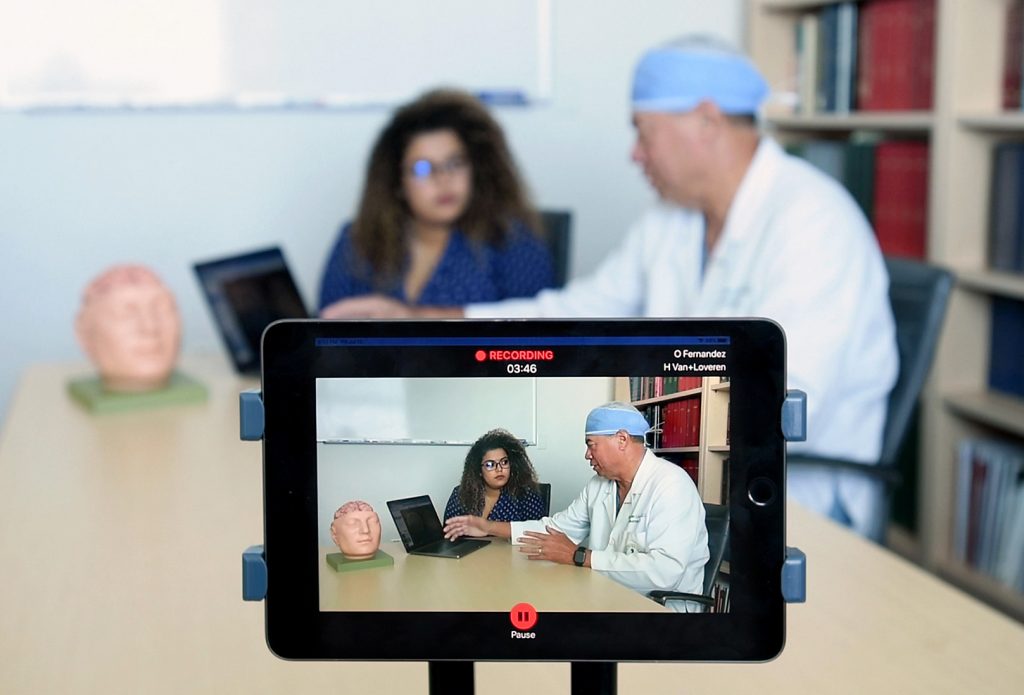A common problem at the end of medical office visits is patients being unable to clearly remember what was talked about, including details about their diagnoses or recommended changes to their diet, activity levels or medications.
In fact, the federal Agency for Healthcare Research and Quality says studies show that patients can forget up to 80 percent of information shared during an office visit and almost half of what they do remember can be inaccurate.
That forgetfulness can obviously negatively affect the patient’s health. It can lead to unnecessary medical complications, added health costs and duplicated effort when the patient or caregivers invariably contact the doctor’s office with follow-up questions.
USF Health’s Department of Neurosurgery is offering a new tool that can avoid many of those issues by providing patients with an online video recording of their visit with their physician, which they and their family can review afterward.
Called the Medical Memory, the service is designed to be HIPAA-compliant and user friendly for both the patient and health care providers. The physician records the visit on a tablet computer, and the recording is then uploaded to a secured website. The Medical Memory emails a link to the video to the patient and anyone else connected to the patient’s account, such as family members or other caregivers.
Fayyadh R. Yusuf, PhD, is the director of physician development in the USF Health Department of Neurosurgery. Dr. Yusuf said he appreciated The Medical Memory’s “simplicity” and how it provides USF Health patients a permanent record of their consult with their physician.
“Knowing that a lot of things get missed in the moment, there’s great security knowing they can simply turn on the video, re-watch it, watch it with family, watch it with their home physician and go, ‘Ok, this is what the doctor said, these are the instructions, this is what we are supposed to do,’” Dr. Yusuf said.

A tablet is used to record a patient-doctor visit.
The Medical Memory, the company that produces the service, was founded in 2015 by Phoenix, Ariz.-based neurosurgeon Randall Porter, MD. According to the company’s website, the company was founded to “improve patient comprehension, satisfaction and trust.”
USF Health was the first health care organization in Florida to adopt the system when it was implemented in January 2020, Dr. Yusuf said and is now part of a pilot project focused on patients in the critical care division. He said having The Medical Memory is useful as the COVID-19 pandemic has limited visitors within the hospital.
“We’re hoping that this really facilitates and eases the burdens on the families that can’t come in and see their loved ones,” he said.
Besides providing videos for patients, physicians can also use The Medical Memory to create libraries of two- and five-minute videos where they can describe health conditions and treatments and then share those videos as part of patient education.
Harry van Loveren, MD, is chair of the Department of Neurosurgery and Vice-Dean of Clinical Affairs in the USF Health Morsani College of Medicine. He said providers have begun regularly using The Medical Memory as part of their clinic hours.
“Why would you have this lengthy in-depth discussion and then not record it?” Dr. van Loveren said.
He said the service has already led to improvements in patient satisfaction and reduced calls to his staff. Dr. Porter’s company said that, in a study involving 400 patients, half of whom used the video recording and upload system and half of whom didn’t, the video patient group generated almost 24 percent fewer calls to their physicians’ offices, freeing up staff time and other resources.
“The number one question (patients) are asked by family members is, ‘What did the doctor say?’” Dr. van Loveren said. “The number one phone call we get about the office visit is, ‘I don’t remember what the doctor told me.’”
The neurology program is also looking to use The Medical Memory to overcome limitations of patients diagnosed with such conditions as dementia or brain tumors, or patients who may have received a critical or even fatal diagnosis and may have trouble processing the rest of what they hear during the visit.
“(With) a diagnosis that might affect clarity or thinking, we are very relieved to know the whole session is being video recorded so their caregivers and significant others can view it,” Dr. van Loveren said, adding, “I think this should be the way that every medical visit is conducted. It is a fantastic record of the visit.”
